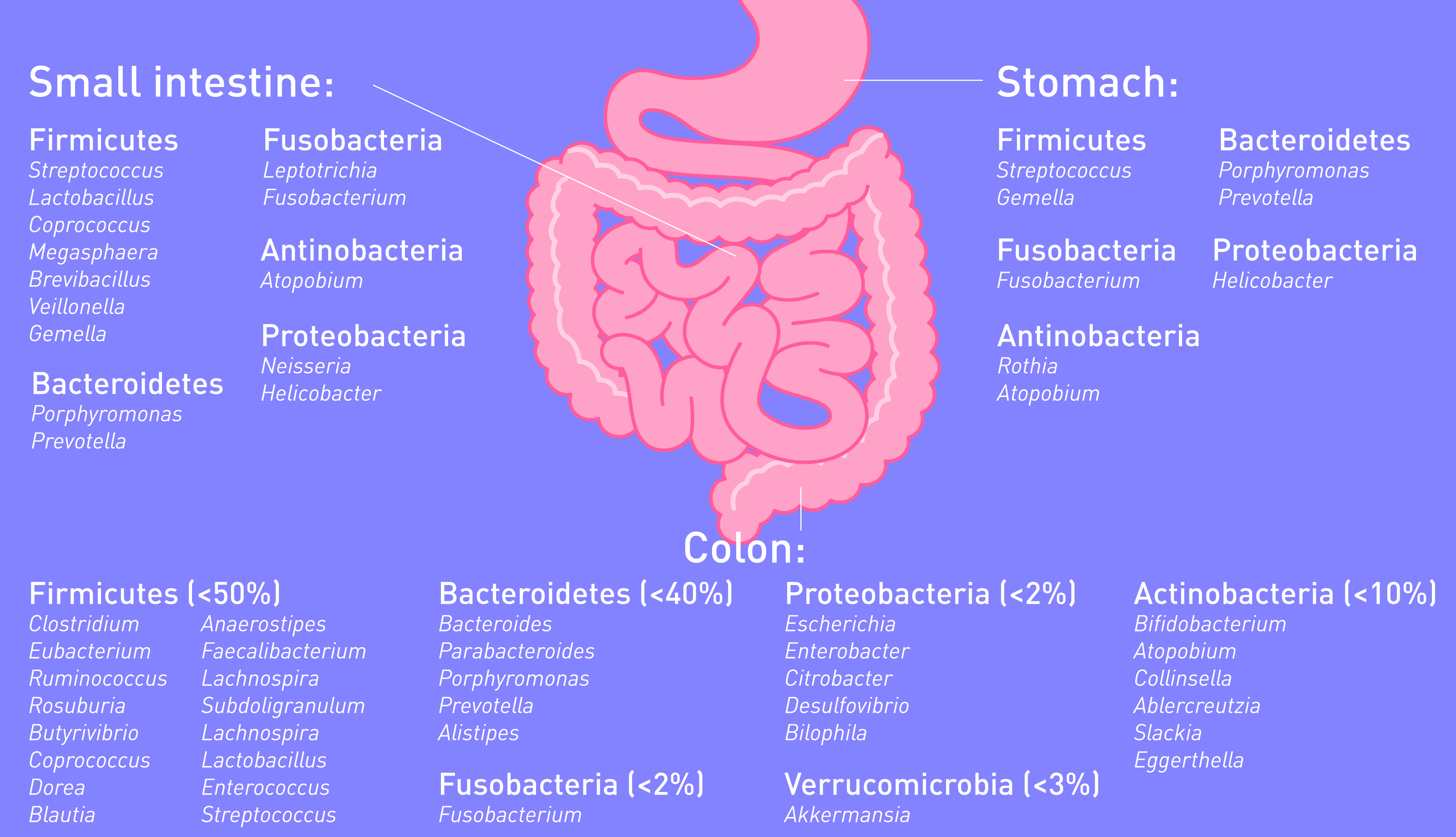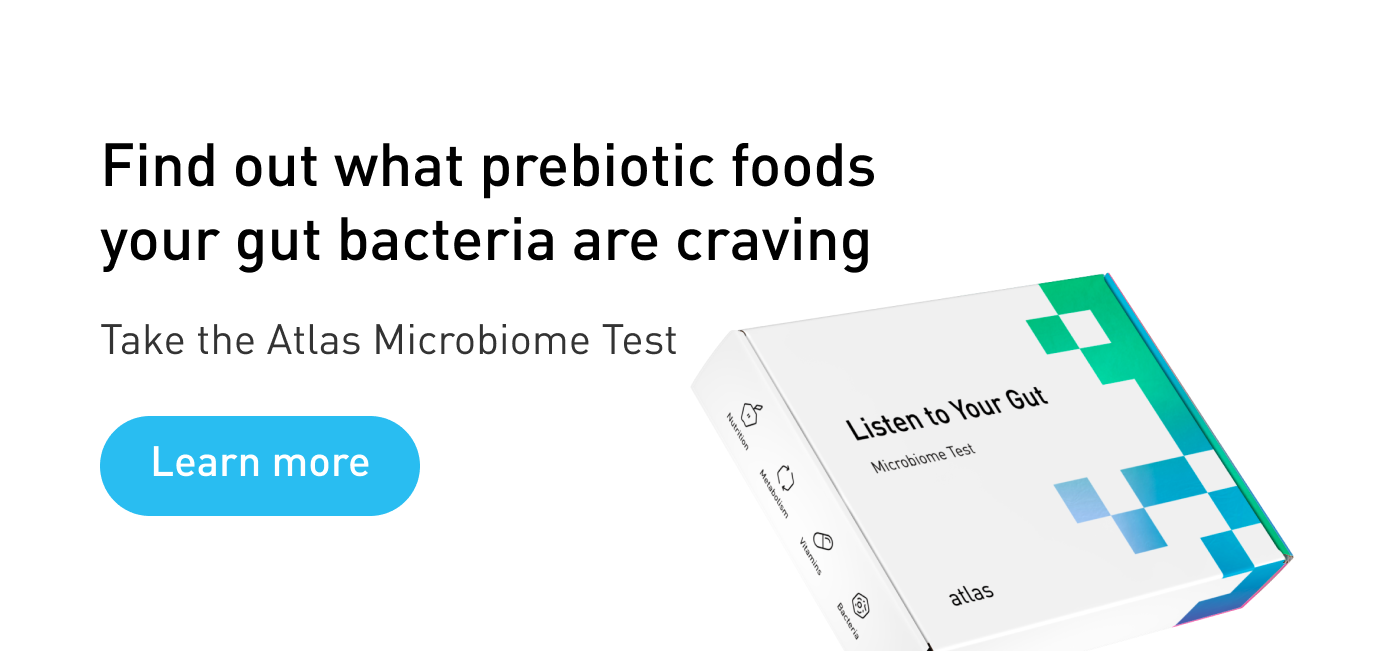Inulin is a prebiotic fiber that feeds your gut microbes. Find out how inulin benefits your health, what foods contain inulin, and why it’s going to make you gassy.
Prebiotics are special molecules that support gut microbiome health by promoting the growth of beneficial bacteria in your colon. Just like you, without food these microbes cannot thrive. Inulin-rich foods can do just that.
Table of contents
Inulin is a type of prebiotic fibre that your gut microbes transform into useful metabolites, like short-chain fatty acids, that keep your gut healthy. In addition to inulin, many different dietary fibers, polyphenols, and resistant starches are prebiotic: they can’t be digested by your body, so your gut bacteria does it for you.
☝️DISCLAIMER☝This article is for informational purposes only. It is not intended to constitute or be a substitute for professional medical advice, diagnosis, or treatment.
What is inulin?
Inulin is found in many common foods, including onions and garlic. The most inulin-rich foods are chicory root and Jerusalem artichoke. However, inulin causes bacteria to produce a lot of gas, which can cause flatulence and abdominal pain. For this reason, it should be consumed in moderation.
Dietitians may recommend avoiding inulin if you have IBS or following a low-FODMAP diet because it is a fructan (also known as fructooligosaccharide or FOS), which may worsen the symptoms of irritable bowel syndrome. This is sometimes referred to as “inulin intolerance”.
☝Is inulin a prebiotic?☝Yes. Inulin is a prebiotic: it stimulates the growth and activity of Bifidobacteria and other beneficial bacteria species.
How does inulin work?

Inulin promotes the abundance of good bacteria that keep your gut healthy and happy like Bifidobacteria, probiotic microbes that help maintain balance in the microbiome and deter invaders.
This is also true of butyrate-producing bacteria – butyrate is a special short-chain fatty acid that fuels gut cells, maintains the gut lining, and combats inflammation.
Inulin is also a type of soluble fibre, which is important for general digestive health. Soluble fiber absorbs water in the gut to form a gel-like substance, which softens stool, reduces hunger, improves motility, and relieves constipation.
Inulin benefits
Inulin is a soluble fibre that nourishes gut microbes, eases constipation, and even helps the body absorb magnesium and calcium. The benefits of inulin also include lowering blood sugar levels in patients with diabetes type II.
1. Gut health and inulin FOS
Prebiotics boost the abundance of health-promoting bacteria in your gut and increase their activity. Inulin is a prebiotic that can help diversify the gut microbiome (which is a sign of gut health) and provide fuel for good bacteria to make important substances, like short-chain fatty acids and vitamins.

By eating inulin-rich foods, you can help your bacteria perform activities that keep your gut healthy. For example, Bifidobacteria, a group of probiotic microbes that feed on inulin foods and inulin supplements, do many valuable jobs for your gut:
- maintaining gut pH by producing lactate and acetate
- feeding other bacteria with metabolites they produce
- deterring pathogens and opportunistic microbes
- modulating the immune system
- making vitamins like B and K
Other types of bacteria also feed on inulin fibre and turn it into butyrate, one of the most important substances for the gut. Butyrate is the main source of fuel for the gut lining. It helps keep the microbiome balanced and prevents inflammation.
2. Inulin and constipation
Inulin is a soluble fibre that can relieve constipation. Soluble fibre absorbs water in the gut, creating a gel-like texture and softening stool. This normalises bowel transit and eases constipation.
A 2019 study showed that 10g of chicory root inulin per day improved both stool frequency and consistency in middle-aged people with mild, chronic constipation. This is confirmed by other studies, which also highlight that inulin did not improve symptoms of abdominal pain or bloating.
☝TIP☝If you want to find out about the composition of your gut microbiome, you need an Atlas Biomed Microbiome Test.
3. Inulin and diabetes
A 2013 study involving 49 women with type II diabetes found that inulin food supplements reduced both fasting blood sugar and HbA1c levels significantly. A review of many studies using inulin fiber confirms that this prebiotic may be helpful for managing blood sugar and blood lipid problems in elderly people with diabetes type II.
☝FACT☝HbA1c is an average measurement of blood sugar levels over the previous 2-3 months.
4. Inulin weight loss

Soluble fiber helps curb hunger and increases the feeling of fullness after meals. There is some research to show that inulin soluble fiber may promote weight loss, particularly in prediabetic individuals.
Researchers suggest that the relationship between inulin and weight loss is mediated by the gut microbiome: inulin encourages the abundance of good gut bacteria, which turn it into propionate, a short-chain fatty acid that can suppress appetite.
5. Inulin for sleep
The link between inulin and sleep is tenuous. Animal studies have shown that a prebiotic diet helps them to get a better quality sleep. It’s believed that nourishing gut bacteria with prebiotics might explain why, because the gut microbiome is able to communicate with the brain via the nervous system. Further research is needed in humans to quantify the effect of inulin for sleep.
6. Improved calcium and magnesium absorption
Inulin fiber improves the absorption of specific minerals in the gut, namely calcium and magnesium. Magnesium is a mineral that the body needs for many biochemical reactions that maintain nerve and muscle function, blood sugar levels, and blood pressure. Calcium is just as important. It supports healthy bones and helps the nervous system to communicate with the body.
Inulin foods
There are approximately 36,000 inulin plant species which naturally contain inulin fiber. However, chicory root is the most abundant source. Chicory root inulin is used in supplements and is often added to some processed foods to replace fat because of its creamy consistency.
Foods high in inulin
| Fruit and vegetables | Plants and grains | Processed or manufactured foods |
|---|---|---|
| asparagus, bananas, leeks, onions | agave, artichoke, chicory root, garlic, wheat, Jerusalem artichoke | cereal or protein bars, milk and yogurt products, baked foods, desserts |
☝TIP☝Chicory root coffee alternative is an excellent way to cut down on your caffeine intake and boost your consumption of fiber and prebiotics for your gut health.
Inulin supplements
Inulin side effects
Inulin is a very gassy fiber because it is fermented by gut bacteria, which produce gas as they break it down. This gas accumulates in the colon, and it can cause significant discomfort. Common inulin side effects include:
- gas or flatulence
- abdominal discomfort
- bloating
- diarrhoea or loose stools
People with irritable bowel syndrome (IBS) may be more susceptible to abdominal distress caused by inulin prebiotic fiber. Individuals who follow a low-FODMAP diet (often for IBS) are advised to avoid inulin-rich foods for this reason.
☝How much inulin per day?☝It is recommended you start on a low dose of 2-3 grams per day for the first 2 weeks before gradually increasing over several weeks to 10g max.
- Azpiroz, F et al. Effect of Chicory-Derived Inulin on Abdominal Sensations and Bowel Motor Function, 2017](https://www.ncbi.nlm.nih.gov/pmc/articles/PMC5499961/)
- Chambers, E, S et al. Effects of Targeted Delivery of Propionate to the Human Colon on Appetite Regulation, Bowdy Weight Maintenance and Adiposity in Overweight Adults, 2015
- Barboi, O, B et al. Effect of Inulin in the Treatment of Irritable Bowel Syndrome with Constipation (Review), 2020
- Boeckner, L, S et al. Inulin: A Review of Nutritional and Health Implications, 2001
- Collado Yurrita, L et al. Effectiveness of Inulin Intake on Indicators of Chronic Constipation; A Meta-Analysis of Controlled Randomized Clinical Trials, 2014
- Dehgan, P et al. Effects of High Performance Inulin Supplementation on Glycemic Status and Lipid Profile in Women with Type 2 Diabetes: A Randomized, Placebo-Controlled Clinical Trial, 2013
- Guess, N, D et al. A Randomized Controlled Trial: The Effect of Inulin on Weight Management and Ectopic Fat in Subjects with Prediabetes, 2015
- Kho, Z, Y and Lal, S, K. The Human Gut Microbiome - A Potential Controller of Wellness and Disease, 2018
- Leach, J, D and Sobolik, K, D. High Dietary Intake of Prebiotic Inulin-Type Fructans in the Prehistoric Chihuahuan Desert, 2010
- Legette, L, L et al. Prebiotics Enhance Magnesium Absorption and Inulin-Based Fibers Exert Chronic Effects on Calcium Utilization in a Postmenopausal Rodent Model, 2012
- Liu, F et al. Effect of Inulin-Type Fructans on Blood Lipid Profile and Glucose Level: A Systematic Review and Meta-Analysis of Randomized Controlled Trials, 2017
- Niness, K, R. Inulin and Oligofructose: What Are They? 1999
- Ramirez-Farias, C et al. Effect of Inulin on the Human Gut Microbiota: Stimulation of Bifidobacterium adolescentis and Faecalibacterium prausnitzii, 2009
- [Robefroid, M, B. Introducing Inulin-Type Fructans, 2005](https://pubmed.ncbi.nlm.nih.gov/15877886/
- Slavin, J. Fiber and Prebiotics: Mechanisms and Health Benefits, 2013
- Watson, A, W et al. Changes in Stool Frequency Following Chicory Inulin Consumption, and Effects on Stool Consistency, Quality of Life and Composition of Gut Microbiota, 2019
- Falony G. et al., In Vitro Kinetic Analysis of Fermentation of Prebiotic Inulin-Type Fructans by Bifidobacterium Species Reveals Four Different Phenotypes, 2008
- Rios-Covian D. et al., Enhanced butyrate formation by cross-feeding between Faecalibacterium prausnitzii and Bifidobacterium adolescentis, 2015


















